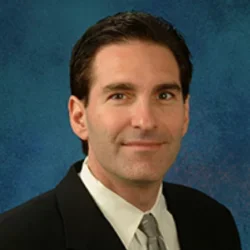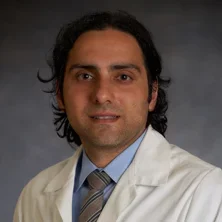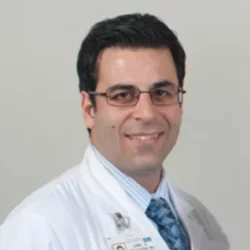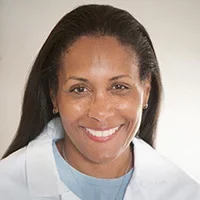Cardiovascular Research in Precision Health
Tailored Cardiovascular Medicine, Care, and Recovery
Cardiovascular disease does not affect everyone the same way. An individual’s susceptibility to disease, response to treatment, and likelihood of survival are partly inherited. Environmental factors (for instance, diet, exercise, and whether or not the person smokes) have an impact, as well. Yet, treatment of cardiovascular disease is too often one-size-fits-all. UCLA takes a different approach. We tailor research, care, and recovery to match an individual’s unique genetics and lifestyle.

Evidenced-Based Cardiovascular Medicine
The first step toward individualized medicine is to make sure patients receive the treatment options that have already been developed and are available. UCLA has long been a leader in evidence-based medicine for cardiovascular care.
The key to success is to make sure patients are receiving the benefits of prior discoveries. Dr. Gregg C. Fonarow notes that without a system in place to make sure that happens, it can take 10 to 15 years from discovery until definitive proof that a therapy improves outcomes for patients.
Although this problem exists worldwide in health care systems, it may be most recognized in cardiology, given the number of very beneficial therapies that exist.

Dr. Boback Ziaeian, uses clinical trials not only to distinguish effective versus ineffective therapies, but scrutinizes data to identify a precision medicine approach tailored towards specific individuals benefiting most from effective therapies. Dr. Ziaeian uses such rigorous scientifically-validated approaches to inform the scientific and clinical community by writing evidence-based guidelines for treating patients.
Precision-based medicine is here to stay and forms the next frontier of providing effective therapies to all, says Dr. Arjun Deb, director of the UCLA Cardiovascular Theme. Just as the same disease may manifest itself with very different presentations in two different individuals, so can therapy. Precision medicine will help us to understand who can benefit most from certain therapies or who we should be more concerned about accelerated disease progression. The UCLA Cardiovascular Theme is using emerging technologies available at UCLA to champion such individualized medicine approaches.
The Precision Health and Institute for Precision Health at UCLA is linking the electronic health record to genetic information of patients. This will enable researchers to determine how common variants in the genetic code affect risk for common diseases as well as determine effectiveness of therapies for common diseases such as diabetes and hypertension.
Soon, all patients who visit a UCLA clinic or hospital will have the chance for their genomes to be scanned for disease markers. Ultimately, the genome scan will:
- Help researchers understand how molecular features (genes, proteins, and other molecules) can be linked with physiological measurements of the function of patients’ hearts and blood vessels
- Provide information that can fundamentally change the way researchers study the cardiovascular system
- Alter the way a person’s physician manages their health to prevent and treat disease
- Become part of medical diagnosis and clinical decision-making
Discovery Science for the Next Generation of Cardiovascular Disease Cures
It will not be possible, physicians explain, to treat every single patient uniquely. But the big difference from current practice is that patients will likely fit into categories of treatment.
Dr. Tom Vondriska, professor of anesthesiology and physiology, says it would be impossible to come up with more than 300 million unique pairs of shoes to perfectly fit everyone in the United States. Offering only small, medium and large sizes wouldn’t work, either.
“If you had 10 sizes, you could make shoes that would be comfortable for probably about 99% of the population,” Vondriska says. “That is what we are trying to do with our approach to cardiovascular disease at UCLA: assign patients to the right group so that we can accurately diagnose and treat their conditions, and thereby dramatically improve quality of life and survival. Our approach at UCLA is to leverage multiple so-called “-omics technologies,” including genomics, epigenomics and proteomics, in models systems and human populations, to discover the molecular signatures of health and disease. We can then use this high resolution information to more effectively care for patients.”
Individualized Care In Action

Today, UCLA’s adult congenital heart disease clinic is one of the largest in the United States. The “UCLA difference” can be seen clearly when heart surgeon Dr. Jamil Aboulhosn operates on an adult with an inherited heart condition.
Each patient has unique anatomical and physiological problems. Dr. Aboulhosn and his colleagues address these patients’ individual situations by:
- Using UCLA imaging technology to visualize the heart
- Using 3-D printing to practice the procedure ahead of time
- Partnering with patients to study molecular signatures of health and disease in humans
The goal is to understand how diseases arise from a combination of lifestyle and genetic factors. With this knowledge, our team of physicians, scientists, surgeons, and engineers can better design strategies for preventing and curing cardiovascular disease on a patient-by-patient basis—providing truly individualized care.
CHAMP: An Example of Successful Hospital-Based Cardiovascular Treatment
Led by Dr. Fonarow, UCLA launched the UCLA Cardiovascular Hospitalization Atherosclerosis Management Program (CHAMP). CHAMP provided the first scientific evidence demonstrating that a hospital-based cardiovascular treatment system could reduce fatal and non-fatal cardiovascular events and improve cardiovascular care quality and outcomes.
CHAMP has demonstrated:
- Improved care quality
- Improved medication adherence (how consistently people took the drugs they were prescribed)
- Reduced health care disparities
- Reduced mortality by 57%
In fact, the scientific evidence provided by CHAMP resulted in changes in guidelines recommended by the National Heart, Lung and Blood Institute (NHLBI), American Heart Association (AHA), and American College of Cardiology (ACC).
The AHA even launched a nationwide program modeled after CHAMP, called “Get With The Guidelines” (GWTG), to apply this model of care at hospitals across the country. GWTG has:
- Been implemented in more than 2,500 U.S. hospitals
- Benefited more than 7 million patients with coronary artery disease, heart failure, atrial fibrillation and stroke
- Produced demonstrated, substantial improvements in quality of care and clinical outcomes among participating hospitals
Getting to the Heart of Big Data
UCLA was recently awarded $11 million to lead a National Institutes of Health (NIH) Center of Excellence for Big Data Computing (BD2K) that focuses on cardiovascular health.

Directed by principal investigator Dr. Peipei Ping, professor of physiology, medicine, and bioinformatics in the David Geffen School of Medicine, the center will:
- Work with five other institutes worldwide to create and test cloud-based tools for integrating and analyzing data about protein markers linked to heart and blood vessel disorders
- Develop computational tools to extract keywords and summarize the most critical medical information from patient records for physicians
- Alter the way a person’s physician manages their health to prevent and treat disease
When integration is complete, users will be able to do a simple search to get the desired information, even from a patient with a chronic disease, who might have 150 pages of medical records.
The big data approach will be a boon to cardiovascular treatment, says Dr. Karol Watson, professor of medicine in the Division of Cardiology. Outcomes of this approach could include:
- Learning how characteristics correspond to outcomes: Doctors will learn who will benefit from statins versus who will be affected by crippling muscle pain caused by these drugs.
- Flourishing research: Dr. Watson is training cardiology fellows and physicians in how to use this big data.
- Advances in treatment: This information will significantly advance effective treatment of heart and blood vessel disorders.
The Hearts of Men and Women

Big data is improving cardiovascular care at UCLA by examining the role of ethnicity and sex in cardiovascular disease across the diverse Southern California population. This real-world information is almost never uncovered in clinical trials.
Dr. Watson helps lead a large, NIH-funded study, the Multi-Ethnic Study of Atherosclerosis (MESA), which has enrolled 6,000 patients in six communities nationwide.
- Participants are equally divided among sex and ethnicity – Black, White, Asian and Hispanic.
- Dr. Watson is the principal investigator for MESA investigation in Venice and San Bernardino.
- More than 1,000 studies have been published from the MESA research, providing information about how the hearts of different sexes and different population groups should be cared for, both in prevention and treatment.
The MESA findings, as well as her own work—Dr. Watson is also director of the UCLA Barbra Streisand Women’s Heart Health Program at UCLA—have shown that heart disease in women is not the same as it is in men.
Among the differences:
- The effects of stress, anxiety and depression on the heart are significantly worse in women than in men.
- Daily low-dose aspirin cuts the risk of heart attack in men, but in women it lowers risk of a stroke, not a heart attack.
- Diagnosis and treatment of cardiovascular disease are carried out less effectively for women than for men.
- When it comes to diabetes risk, high carbohydrate intake is much worse for women than for men.